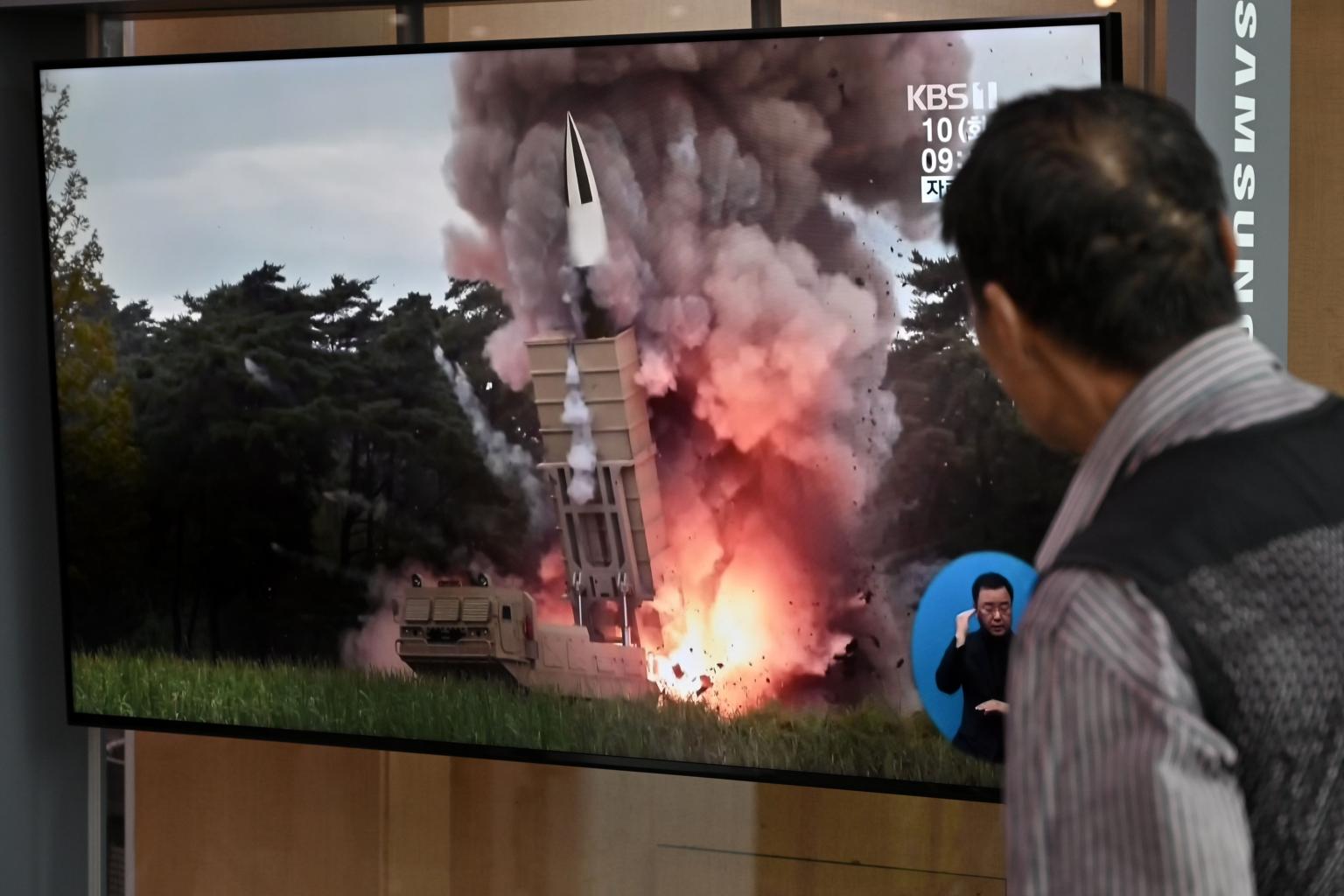North Korea fires sub-based missile after saying it will resume nuclear talks with US
Sign up now: Get insights on Asia's fast-moving developments

A man watches file footage of a North Korean missile launch, at a railway station in Seoul, on Sept 10, 2019.
PHOTO: AFP
SEOUL (BLOOMBERG) - North Korea fired what appeared to be a submarine-based ballistic missile off its eastern coast on Wednesday (Oct 2) in an escalation that came just hours after saying it would resume stalled nuclear talks with the United States.
South Korea's military said North Korea may have fired a submarine-based ballistic missile, which travelled 450km and reached an altitude of 910km into space before falling in the sea.
Japanese Chief Cabinet Secretary Yoshihide Suga said the missile may have separated during flight, with at least one piece falling in the country's exclusive economic zone (EEZ) near the south-western prefecture of Shimane.
"The launch of this type of ballistic missile is a violation of United Nations resolutions. Japan strongly protests and condemns the action," Prime Minister Shinzo Abe told reporters in an emergency news conference.
The South Korean Defence Ministry said it couldn't confirm whether the missile was launched at sea or from a land-based site.
A submarine-based missile test would mark an escalation from the series of short-range launches that North Korea started in May, involving land-based missiles.
The missile was the longest-range weapon that Kim Jong Un's regime has tested since his last intercontinental ballistic missile test in November 2017, a move that may be designed to increase its bargaining leverage.
South Korea said the missile tested on Wednesday may have been from the Pukguksong group of submarine-launched weapons, which have ranges in excess of 1,000km.
David Wright, co-director of the Union of Concerned Scientists, said based on details released about its flight, the missile could have a maximum range of about 1,900km.
The few pieces of information available suggest it could be a new solid-fuel missile known as the Pukguksong-3, according to Ankit Panda, an adjunct senior fellow at the Defence Posture Project for the Federation of American Scientists.
US President Donald Trump has so far shrugged off a recent flurry of shorter-range missiles launches, with the State Department saying on Tuesday that the two sides had agreed to resume working-level talks this week.
"North Korea is always trying to push the boundaries of what the international community will accept as far as they can go, and timing launches at moments when the United States is less likely to object certainly meets that goal," said Mr Mintaro Oba, a former US diplomat who worked on Korean Peninsula issues.
A senior administration official said the US is aware of the missile-launch reports, adding: "We are continuing to monitor the situation and consulting closely with our allies in the region."
The test comes after former national security adviser John Bolton, a target of Pyongyang's ire during his time in Trump's White House, said on Monday in Washington the US can't "simply pretend" North Korea is making progress towards denuclearising, adding Kim will never give up his nuclear stockpile without more pressure.
Mr Kim and Mr Trump agreed at a June 30 meeting in the Demilitarised Zone that divides the Korean Peninsula to hold working-level talks in a matter of weeks. But the two sides have not met since then to discuss details of a disarmament deal.
The Wednesday launch came after North Korea's state media reported it would restart working-level denuclearisation talks on Saturday.
The Korean Central News Agency quoted Vice-Foreign Minister Choe Son Hui as saying North Korea's representatives are "ready to attend" talks and look forward to an improvement in US-North Korea ties. The two sides agreed to have a "preliminary contact" the day before the talks, Ms Choe is quoted as saying, without mentioning where the meeting would take place.
North Korea previously criticised South Korea's deployment of a new stealth fighter jet, which made its first public appearance during a military day on Tuesday.

Pyongyang has fired off at least 15 missiles in 10 different military tests since May, extending the regime's most prolific run of launches since Mr Trump took office.
Little progress has been made towards an agreement on North Korea's nuclear programme despite three meetings between Mr Kim and Mr Trump.
Meanwhile, weapons experts said North Korea has been adding fissile material to its nuclear arsenal and improving its ability to launch a nuclear strike against the US as well as its allies Japan and South Korea.


